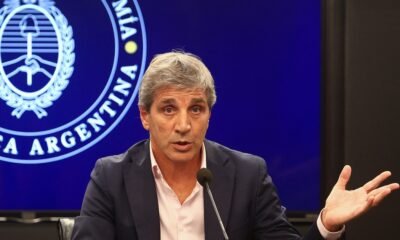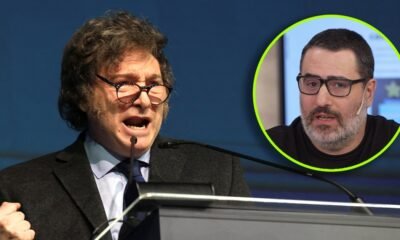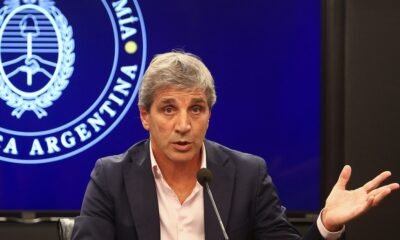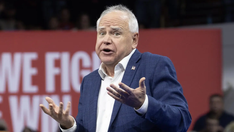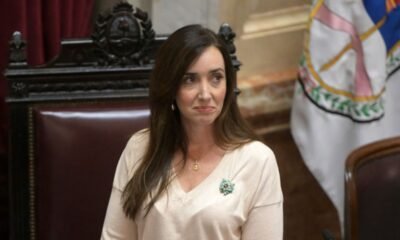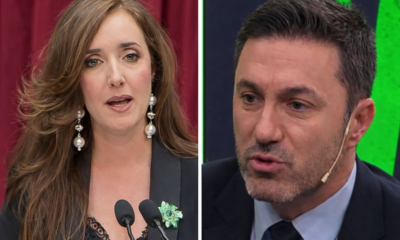INTERNACIONAL
El legado político de José Mujica: un presidente promovido por él y un sector con un poder sin precedentes
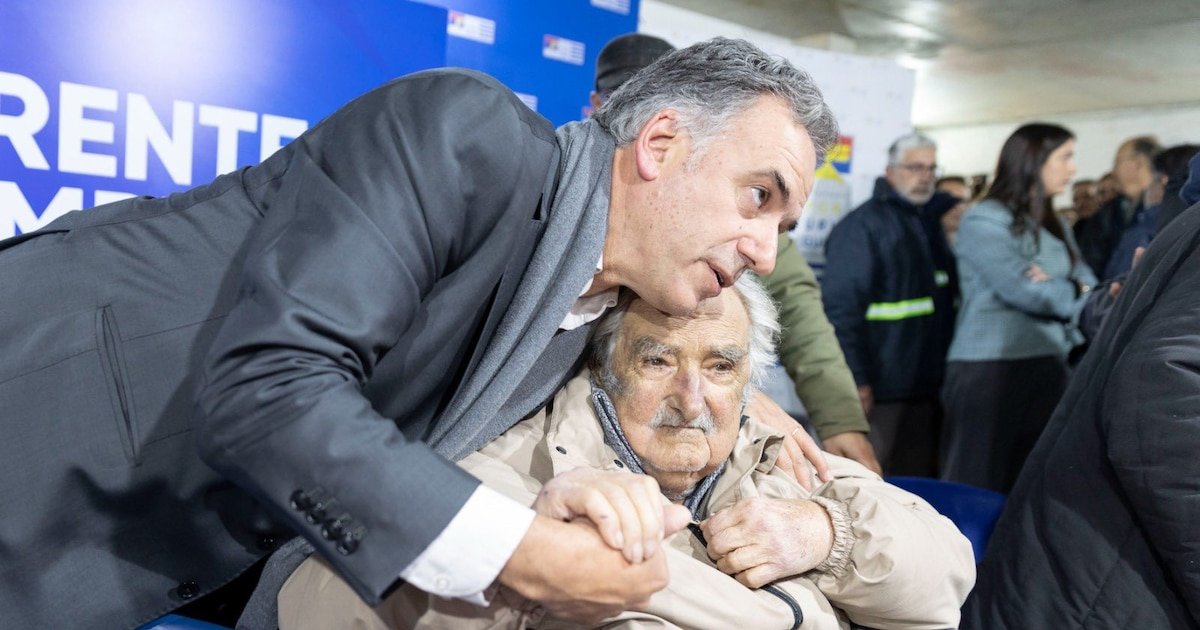
Sentado al lado de su esposa, el ex presidente uruguayo José Mujica vio cómo Yamandú Orsi se convirtió en el presidente electo de la República. El intendente de Canelones, el dirigente al que había promovido hacía cinco años para ese puesto, al que conocía hacía 40 años, había llegado a su máximo lugar al que un político puede aspirar. Es probable que ese día, frente al televisor, Mujica haya pensado que su legado continúa.
Un mes antes de que Orsi fuera electo presidente en el balotaje, el sector político de Mujica, el Movimiento de Participación Popular (MPP), había conseguido una votación histórica en las urnas. Con 435 mil votos, no solo fue el espacio político más votado del Frente Amplio sino que obtuvo una bancada poderosa: el bloque tiene nueve de las 16 bancas frenteamplistas en el Senado y 36 de las 48 en Diputados.
Fue en abril de 2024 que Mujica anunció que tenía cáncer y eso lo mantuvo alejado de buena parte de la actividad política. Si bien participó de actos –y su presencia nunca pasaba desapercibida–, el ex mandatario decía que su participación no era la que pretendía. Él, aseguraba, estaba acostumbrado a tener varias actividades políticas por día, algo que su salud no le permitía.

Sin embargo, antes de las elecciones nacionales de octubre, Mujica apareció de sorpresa al acto de cierre de campaña del MPP. Convocado por su esposa, el histórico dirigente de la izquierda uruguaya dijo en su discurso que era la primera vez que no participaba en una campaña electoral. “Pero tenía que venir hoy acá, por lo que simbolizan ustedes”, expresó ante la multitud.
Y reflexionó: “Soy un anciano que está muy cerca de emprender la retirada de donde no se vuelve, pero soy feliz porque están ustedes, porque cuando mis brazos se vayan habrá miles de brazos sustituyendo la lucha y toda mi vida dije que los mejores dirigentes son los que dejan una barra que lo supera con ventaja”.

El ex presidente uruguayo José Mujica con militantes del Frente Amplio en una plaza de Florida, a 100 kilómetros de Montevideo (MPP)
Tras la victoria electoral, Mujica dijo que el triunfo era “un premio” en su retiro. “Son casi 35 años de lucha que están ahí, que se me fueron. Quedó algo que va más allá de mi vida”, declaró al noticiero Subrayado de Canal 10. El ex presidente –que gobernó Uruguay entre 2010 y 2015– expresó su deseo de que Orsi mantenga un “espíritu abierto” e “inclusivo”. “Tiene mucha responsabilidad hoy”, dijo.
En esa entrevista, Mujica destacó que el MPP se convirtió en el “partido más votado del Uruguay” y resaltó que tuvo más votos que la histórica lista 15 del Partido Colorado en la década del 50. “Es mucha responsabilidad. No sé si es bueno. El problema es que ya está. Yo que sé si bueno. Me hubiera gustado un poco más equilibrado”, analizó.

Esa vez, Mujica dijo que Orsi era el “mejor candidato”, aseguró que lo conocía hace más de “30 años” y destacó su gestión al frente de la Intendencia de Canelones. “Fue un gran administrador y buen negociador. Al punto que logró que buena parte de los blancos [como se le llama a los dirigentes del Partido Nacional] colaboraran en un acuerdo que logró contra la orden del presidente [Luis Lacalle Pou]”, sostuvo.
En su mensaje de despedida, el presidente Orsi compartió una serie de imágenes acompañado de Mujica y otros líderes políticos, como el brasileño Lula da Silva. En el video, el actual mandatario destaca que el líder político fallecido y su esposa demostraron saber abrir espacio a la gente joven.

“Soy un agradecido de haber podido transitar, con muchos de ustedes, este largo camino que nos lleva hasta acá. Pepe, vos siempre nos has planteado que lo más importante para un militante como ustedes era lograr que apareciera una barra que los superara con distancia. Está difícil que esa distancia sea muy larga. Pero no tengan dudas de que vamos a hacer todo lo posible porque ustedes nos marcaron el camino”, expresó Orsi en un discurso, que recordó en su mensaje de despedida.
South America / Central America,Obituaries,MONTEVIDEO
INTERNACIONAL
Video shows IDF F-35I ‘Adir’ shooting down Iranian fighter jet over Tehran
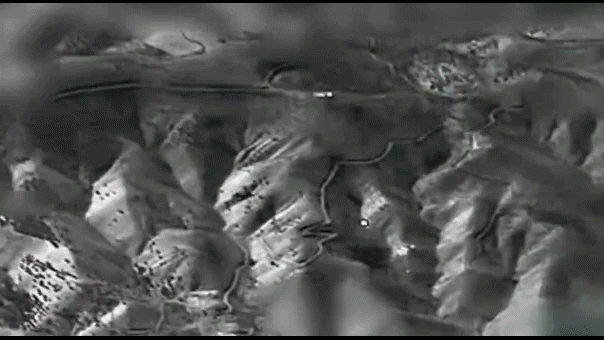
NEWYou can now listen to Fox News articles!
The Israel Defense Forces on Thursday released a video it said shows the moment an Israeli F-35I «Adir» stealth fighter jet shot down an Iranian air force Yak-130 over Tehran, marking the first time the advanced aircraft has downed a manned fighter in combat.
«Completed. Target down. The target is down,» the pilot can be heard saying in the footage set to «Star Wars» theme music.
Israel’s military said Wednesday that the shoot down over the Iranian capital was a key milestone for its F-35 fleet.
Maj. Gen. Tomer Bar, commander of the Israeli air force, commended the pilots who carried out the mission as part of Operation Roaring Lion.
An Israeli Air Force F-35I «Adir» shoots down an Iranian Yak-130 fighter jet in a historic aerial engagement. (@IDF/X)
«The historic shoot down over the Tehran skies is a testament to the strength of the Israeli Air Force and to your personal determination,» Bar said. «The war continues – return home safely. Get some rest. The next mission is already waiting for you.»
The F-35I is Israel’s customized version of the U.S.-made F-35 Lightning II, a fifth-generation stealth fighter that anchors the country’s air fleet.
Israel became the first country to select the aircraft through the U.S. government’s Foreign Military Sales process in 2010 and received its first jet in June 2016.
TRUMP SAYS US SANK 10 SHIPS IN IRAN STRIKE, ‘LAST, BEST CHANCE’ TO ACT

An Iranian Yak-130 is struck midair by an Israeli F-35I «Adir» during a high-stakes confrontation. (@IDF/X)
The Israeli air force gave the aircraft the Hebrew name «Adir,» meaning «Mighty One.»
The Yak-130, by contrast, is a Russian-made, two-seat combat training aircraft designed by the Yakovlev Design Bureau and manufactured by United Aircraft Corporation.
It first flew in 1996 and remains in active production.
Iran received its first Yak-130 aircraft in September 2023, according to Press TV, Iran’s state-run English-language broadcaster, as part of a broader effort to modernize its air force.
3 US WARPLANES SHOT DOWN BY KUWAITI AIR DEFENSES, PILOTS BAIL OUT IN FRIENDLY FIRE INCIDENT, CENTCOM SAYS

A Russian-made Yak-130 subsonic two-seat advanced jet trainer and light attack aircraft maneuvers during a flying display on the third day of the Farnborough International Airshow in Hampshire, England, on July 11, 2012. (Adrian Dennis/AFP via Getty Images)
CLICK HERE TO DOWNLOAD THE FOX NEWS APP
In November 2023, Brig. Gen. Mahdi Farahi, Iran’s deputy defense minister, told Tasnim, a semi-official Iranian news agency, that plans had been finalized for Sukhoi Su-35 fighter jets, Mil Mi-28 attack helicopters and additional Yak-130 trainers to join the country’s armed forces.
Iran previously acquired MiG-29 fighter jets from Russia in the 1990s.
war with iran,israel,middle east
INTERNACIONAL
Tom Emmer calls for Tim Walz, Keith Ellison to ‘serve jail time’ if fraud coverup allegations are true
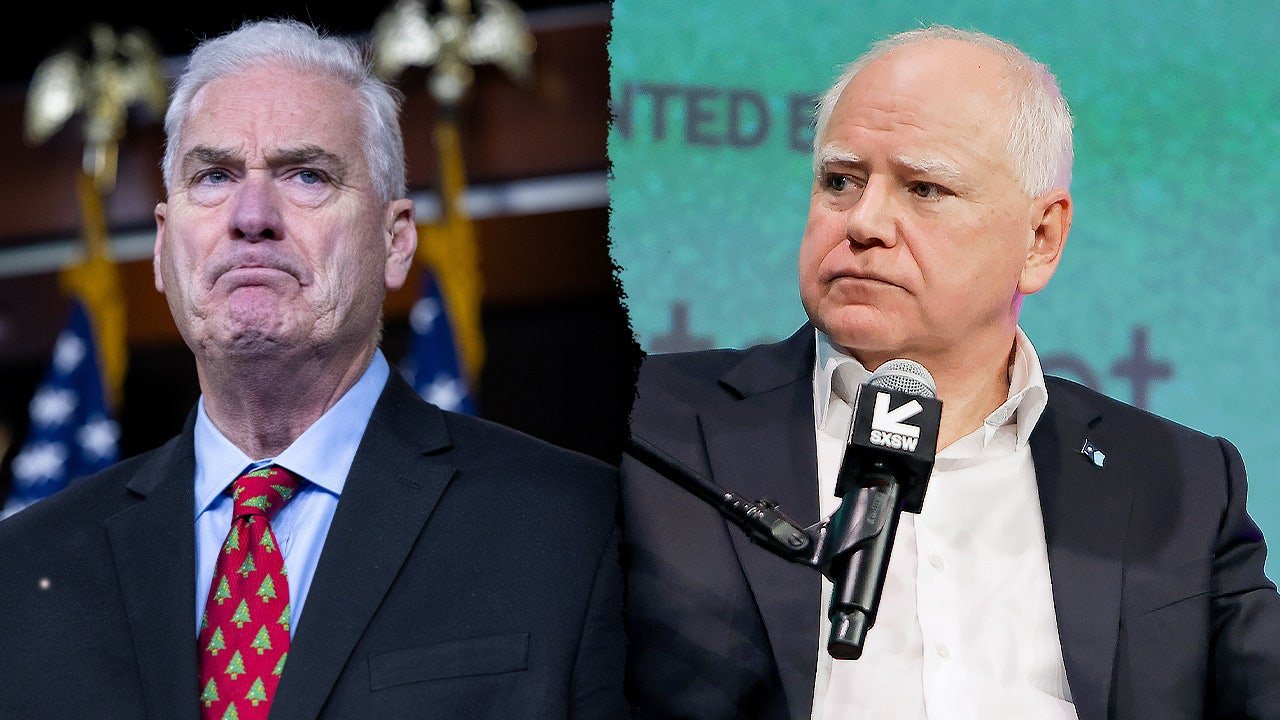
NEWYou can now listen to Fox News articles!
EXCLUSIVE: The highest-ranking Minnesotan in Congress is calling for a deeper investigation into allegations that leaders in his state government knowingly ignored evidence of welfare fraud, and he called for those leaders to even face incarceration if proven true.
«People are sick and tired of elected officials having a double standard, being treated differently than they are. They’re held accountable for things that they should be held accountable for, when their elected officials are not,» House Majority Whip Tom Emmer, R-Minn., told Fox News Digital.
«If these two guys are dirty, they should be held accountable, and they should serve jail time.»
He was referring to Minnesota Gov. Tim Walz and state Attorney General Keith Ellison, two of several witnesses at a high-profile hearing on fraud conducted by the House Oversight Committee on Wednesday.
House Majority Whip Tom Emmer is criticizing Minnesota Gov. Tim Walz’s administration over the fraud scandal plaguing the state. (Nathan Posner/Anadolu via Getty Images; Tibrina Hobson/Getty Images)
Both Walz and Ellison insisted that they were serious about prosecuting fraud in the state’s social programs and that they took action to stop it once it was brought to their attention.
But Emmer cited a report by the House Oversight Committee that accused them both of knowing about the fraud earlier than previously thought and delaying public accountability for fear of political retribution from progressives in the state — particularly the Somali community in Minneapolis, who Republicans have accused of taking advantage of the state’s welfare system.
«They might have been able to qualify it enough that it wasn’t black and white, but if they lied to the committee this morning about knowing about the fraud and when they knew about the fraud and the FBI investigation, that is a criminal act of its own,» Emmer told Fox News Digital.
SCATHING AUDIT REVEALS MORE FRAUD CONCERNS INSIDE TOP MINNESOTA AGENCY WITH FABRICATED DOCUMENTS, ‘MISCONDUCT’
«So I do believe, depending on this report and what else the majority staff is doing, they very well may want to call them back in and depose them under oath.»

Minnesota Attorney General Keith Ellison speaks during a Senate Homeland Security Committee hearing on Capitol Hill. (Tom Brenner/AP Photo)
He added at another point, «You have maybe 80 to 100,000 Somalis in Minnesota. Tim Walz won with 52%. They made a difference. Keith Ellison won by less than 1%. I think it was 20,000 votes. Makes a difference. So if those are connected, yeah, I mean, this is campaign fraud.»
«I’ve taken accountability for this. I’m not going to run again. I need to spend the time fixing this,» Walz said during the hearing. «This does undermine trust in government. Do I wish there were things that could have happened earlier? Yes. But in this job, ‘wish’ didn’t do it. I’m looking into where I see it.»
CONVICTED MINNESOTA FRAUDSTER ALLEGES WALZ, ELLISON WERE AWARE OF WIDESPREAD FRAUD
At another point, Walz attributed the rise in fraud statistics to an increase in prosecutions, telling Republicans, «When you catch people and prosecute them, it shows up as a fraud increase.»
He also dismissed accusations that he kept whistle-blowers quiet over fear of being seen as Islamophobic, «I can’t speak to it because it’s not anything I would say.»
Ellison, meanwhile, said he was happy to work across bipartisan lines to prosecute fraud.

Minnesota Gov. Tim Walz testifies during a House Oversight and Government Reform Committee hearing at the U.S. Capitol Building in Washington, D.C., on March 4, 2026. (Anna Moneymaker/Getty Images)
«I am here to work to improve this system, and there are improvements that can be made,» he said. «If we can get out of fixing the blame and get to fixing the problem, that would be an enormous thing for me.»
CLICK HERE TO DOWNLOAD THE FOX NEWS APP
But Emmer, who maintained that further investigation was needed, suggested he doubted their intentions.
«It’s power. They want power. In order for them to get power, they need to be elected. In order for them to get elected, they have to cheat in different ways. And that is exactly what they did,» Emmer said. «If the Somali community is being used by these public officials to get themselves into office…it sure does look suspect, it needs to be investigated.»
politics,house of representatives politics,minnesota fraud exposed,tim walz
INTERNACIONAL
Vuelven las filas por combustible en Bolivia y crece la presión sobre el Gobierno por la calidad del suministro
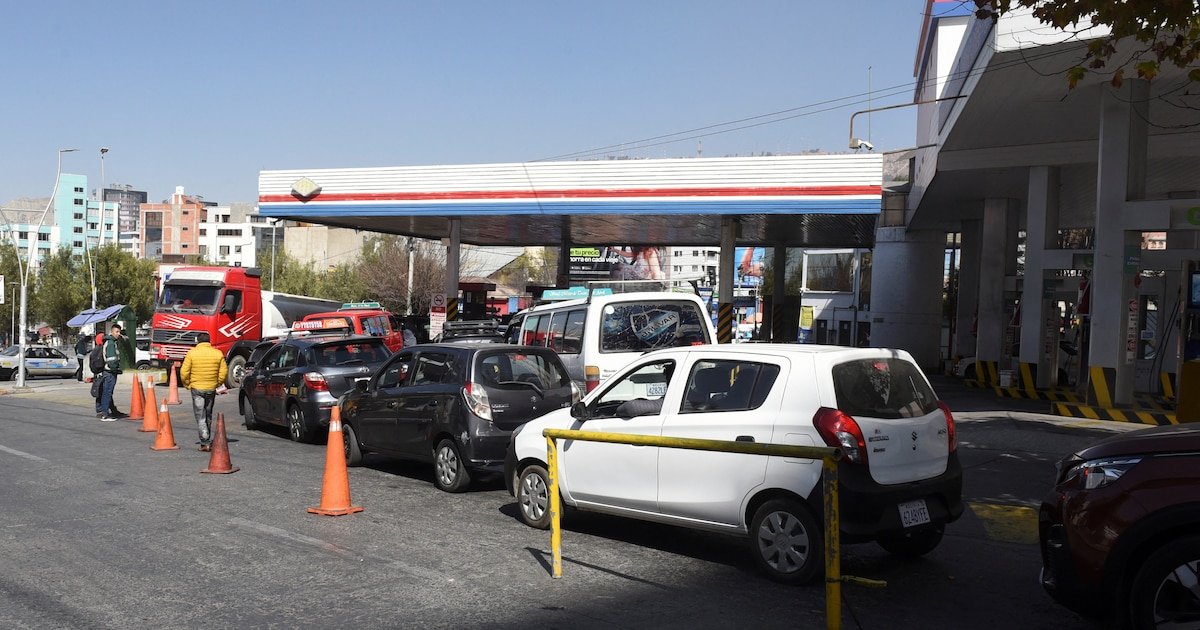
En los últimos días volvieron a registrarse filas de vehículos en los surtidores de La Paz y Santa Cruz de la Sierra ante el anuncio de demoras en los despachos por parte de Yacimientos Petrolíferos Fiscales Bolivianos (YPFB).
A través de un comunicado publicado el martes, la petrolera informó que debido al proceso de preparación e incorporación de nuevos aditivos en la gasolina, se podía presentar una “leve demora” en la distribución y que la situación se normalizaría “en las próximas horas”. Sin embargo, hasta las primeras horas de este jueves, las filas continuaban en las estaciones de servicio.
El procedimiento que se realiza en la gasolina se produce en medio de un escándalo por la calidad del combustible al que se atribuye el bajo rendimiento de los vehículos y daños en motores reportados en los últimos meses. Según el Colegio de Ingenieros Mecánicos de Bolivia (CIMB), al menos el 60% de los vehículos que actualmente se encuentran en talleres mecánicos presentan problemas relacionados con el carburante.
El presidente de YPFB, Yussef Alky, admitió en una conferencia de prensa anterior que la petrolera distribuyó combustible contaminado con residuos de goma y manganeso que quedaban en los tanques de almacenamiento heredados de la anterior gestión.
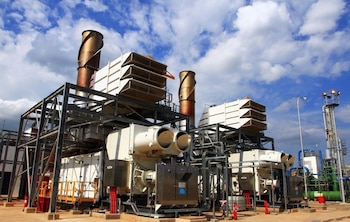
POLITICA
YPFB
El presidente Rodrigo Paz calificó esta situación como un acto de “sabotaje” dentro de la estatal petrolera y afirmó que ya se tiene identificados a los responsables. Sin embargo, a más de un mes de iniciado el conflicto, aún no se han presentado los presuntos implicados, ni se ha explicado la forma en la que han operado ni tampoco las estrategias para evitar que vulneraciones de ese tipo se repitan en la empresa más grande e importante del país.
Por lo pronto, la petrolera informó que se incorporarán antioxidantes y detergentes para remover partículas, evitar la formación de elementos dañinos y la degradación de la gasolina, lo que es una práctica “ampliamente utilizada a nivel internacional”.
Guido Moreno, presidente del Colegio de Mecánicos, cuestionó lo que considera una falta de planificación. “Es un proceso que se debe hacer de forma profesional, con instalaciones y equipos precisos para este tipo de tareas .Se entiende que se pueda retrasar un poco el despacho, pero debería haber estado planificado”, manifestó en una entrevista televisiva.
En paralelo a este procedimiento, el Gobierno dispuso la militarización de las plantas de YPFB en El Alto, Cochabamba y Santa Cruz con el objetivo de “defender” a la petrolera de “las mafias y de la corrupción”. El presidente Paz señaló que esta decisión apunta a realizar un seguimiento en toda la cadena de producción y distribución para garantizar la trazabilidad de los combustibles.
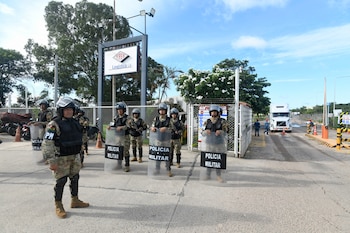
Bolivia atraviesa desde hace tres años una crisis de carburantes que inició con periodos de desabastecimiento y continúa con problemas para garantizar los estándares de calidad.
Los crecientes problemas de importación por la falta de divisas provocaron periodos de escasez que iniciaron en 2023 y se fueron haciendo cada vez más frecuentes y prolongados. El nuevo gobierno, que tomó posesión en noviembre de 2025, levantó el subsidio a los combustibles que estuvo vigente durante más de 20 años y suponía uno de los mayores gastos públicos. Paralelamente, el suministro se fue regularizando, pero surgieron cuestionamientos sobre los controles y la calidad de la gasolina que se distribuye.
En ese marco, la Cámara de Senadores convocó para este jueves al ministro de Hidrocarburos, Mauricio Medinaceli, para brindar un informe sobre la gasolina y otras cuestiones relacionadas a la estatal petrolera. La cita está programada para las 14:00, hora local.

 POLITICA3 días ago
POLITICA3 días agoPuertas adentro, Villarruel explotó: «El esfuerzo no lo hizo la política» y demolió el relato económico de Milei

 CHIMENTOS3 días ago
CHIMENTOS3 días agoPampita se mudó a un castillo francés de detalles alucinantes: «1000 metros, 14 ambientes, vale 11 millones de dólares»

 POLITICA2 días ago
POLITICA2 días agoPetri y Villarruel se cruzaron por un gesto en el Congreso: de “golpista” a “te conozco por el trencito de la alegría”

